Unit 5 Do you have a soccer ball? Section A 课件(共73张PPT,无音频) 2023-2024学年人教版七年级英语上册
文档属性
| 名称 | Unit 5 Do you have a soccer ball? Section A 课件(共73张PPT,无音频) 2023-2024学年人教版七年级英语上册 |
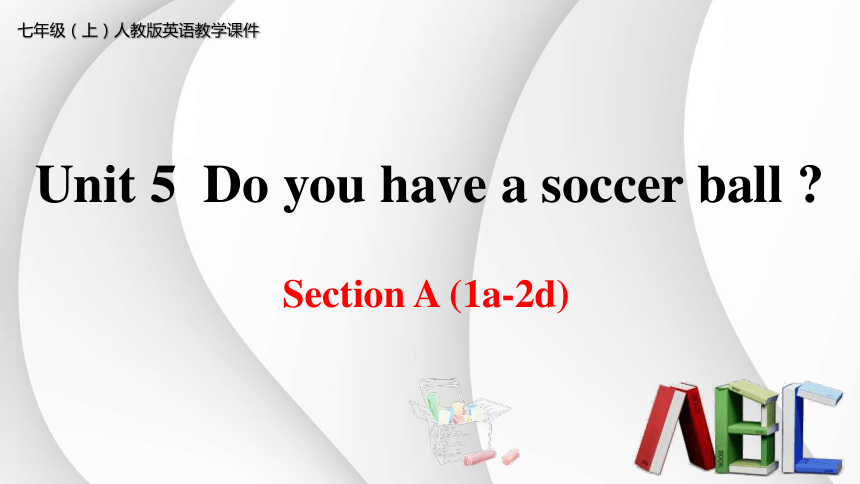
|
|
| 格式 | pptx | ||
| 文件大小 | 13.9MB | ||
| 资源类型 | 教案 | ||
| 版本资源 | 人教新目标(Go for it)版 | ||
| 科目 | 英语 | ||
| 更新时间 | 2023-11-21 16:49:00 | ||
图片预览

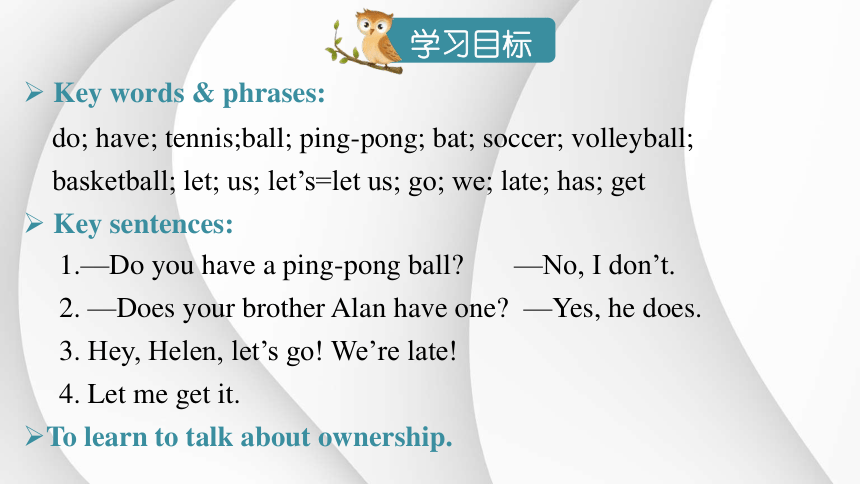
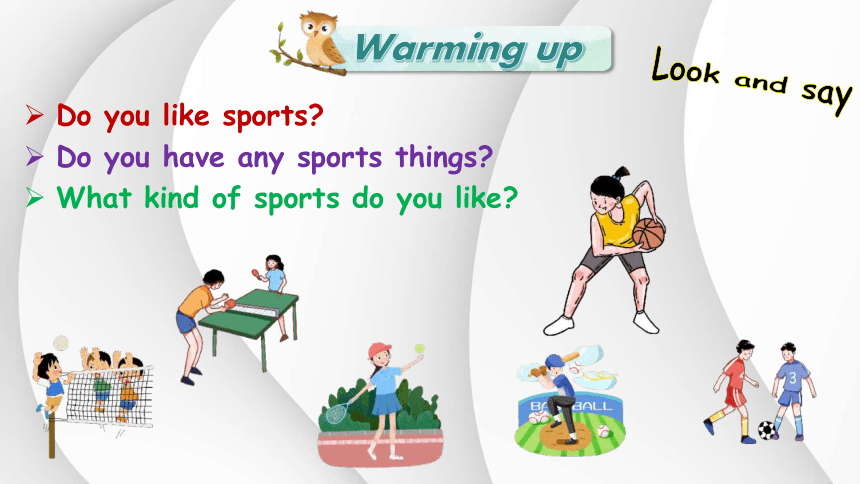
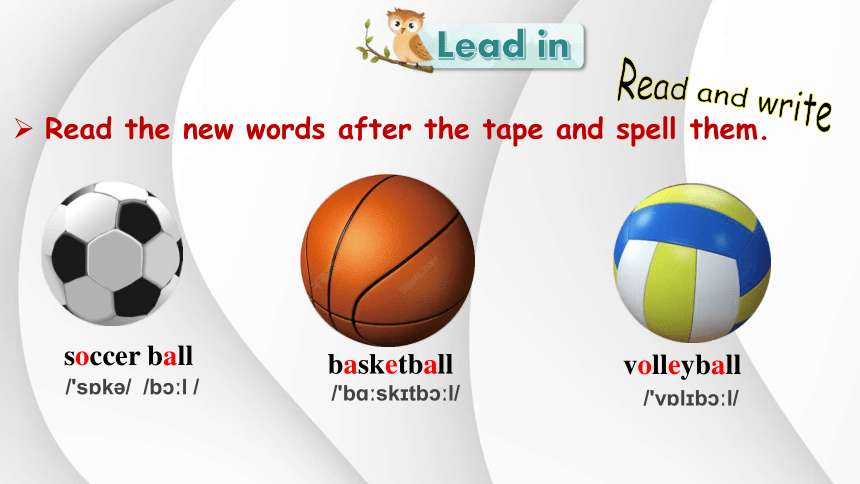
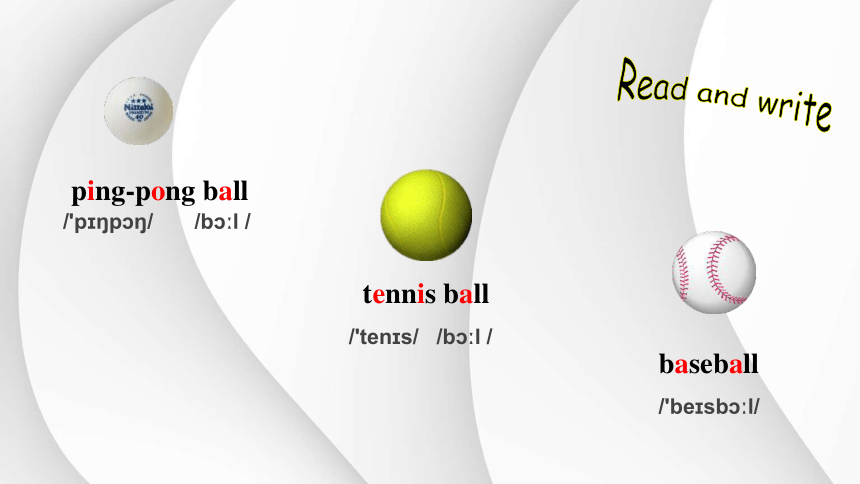
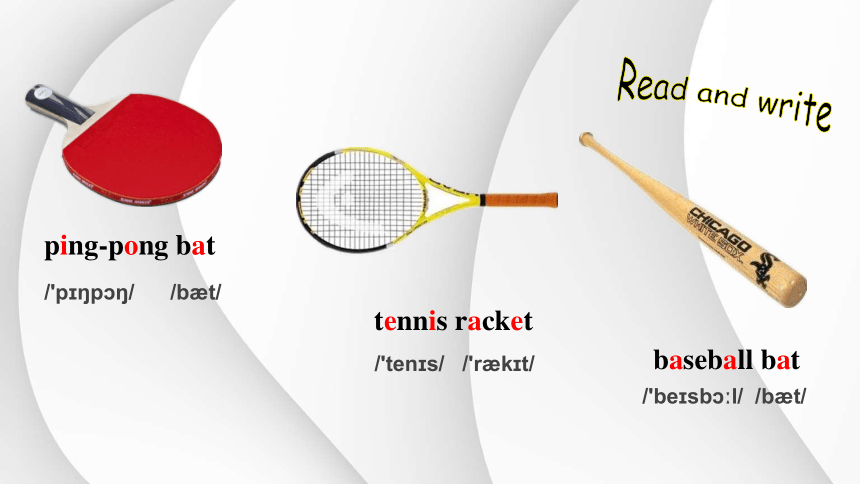

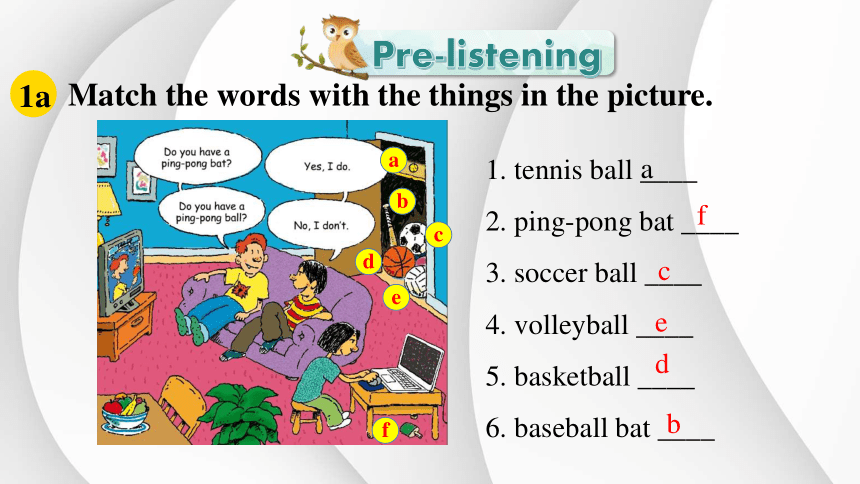
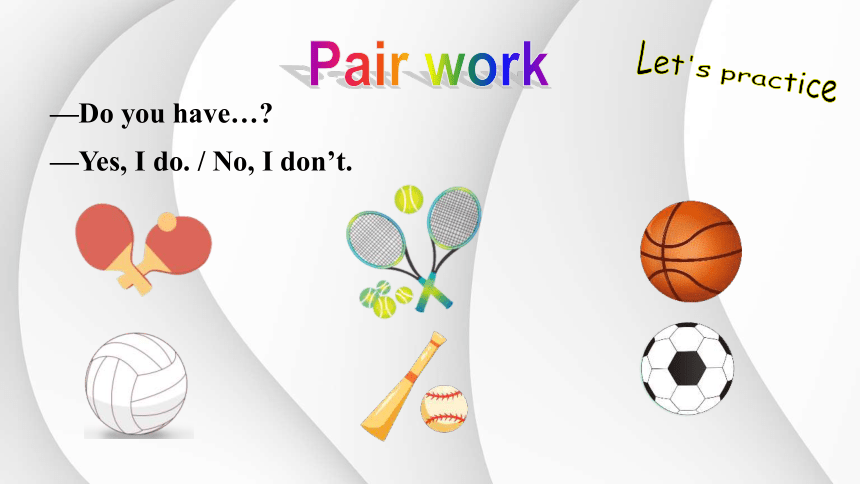
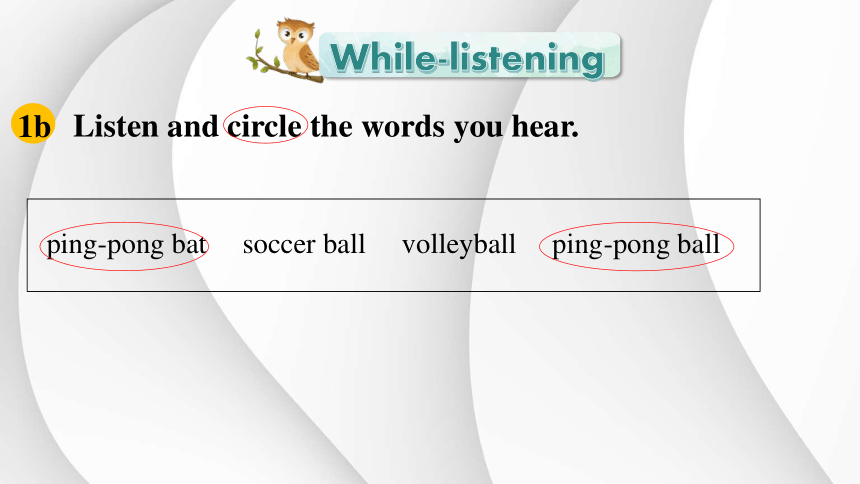
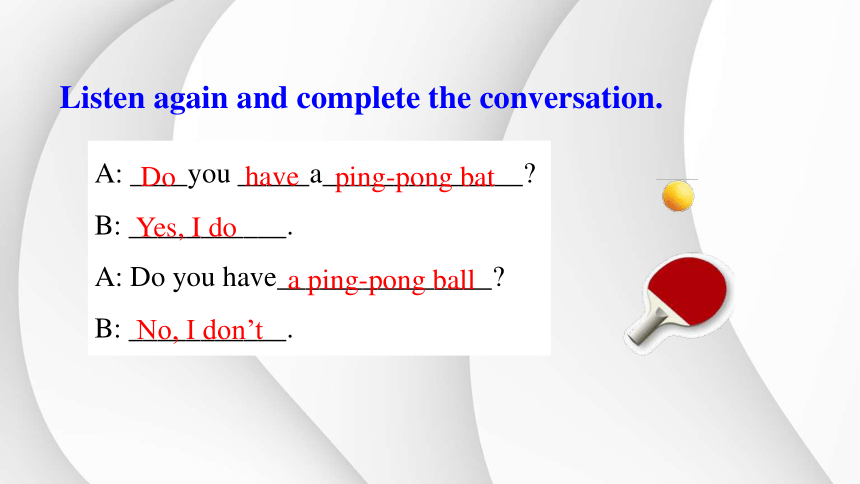
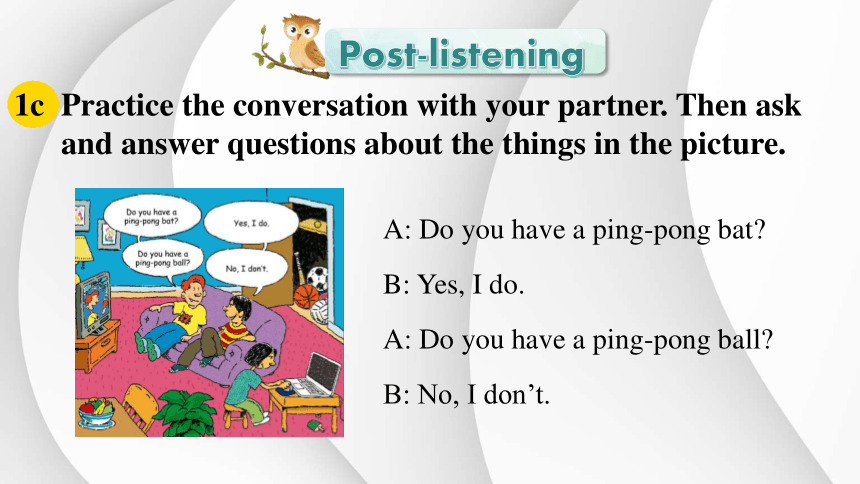
文档简介
(共73张PPT)
Unit 5 Do you have a soccer ball
Section A (1a-2d)
七年级(上)人教版英语教学课件
学习目标
Key words & phrases:
do; have; tennis;ball; ping-pong; bat; soccer; volleyball;
basketball; let; us; let’s=let us; go; we; late; has; get
Key sentences:
1.—Do you have a ping-pong ball —No, I don’t.
2. —Does your brother Alan have one —Yes, he does.
3. Hey, Helen, let’s go! We’re late!
4. Let me get it.
To learn to talk about ownership.
Warming up
Look and say
Do you like sports
Do you have any sports things
What kind of sports do you like
Lead in
Read and write
Read the new words after the tape and spell them.
basketball
/'bɑ sk tb l/
volleyball
/'v l b l/
soccer ball
/'s k / /b l /
Read and write
ping-pong ball
/'p p / /b l /
tennis ball
baseball
/'be sb l/
/'ten s/ /b l /
Read and write
ping-pong bat
/'p p / /b t/
tennis racket
baseball bat
/'ten s/ /'r k t/
/'be sb l/ /b t/
Memory challenge
Pre-listening
1a
Match the words with the things in the picture.
1. tennis ball ____
2. ping-pong bat ____
3. soccer ball ____
4. volleyball ____
5. basketball ____
6. baseball bat ____
a
b
f
e
d
c
a
b
c
d
e
f
Pair work
—Do you have…
—Yes, I do. / No, I don’t.
Let's practice
While-listening
1b
Listen and circle the words you hear.
ping-pong bat soccer ball volleyball ping-pong ball
Listen again and complete the conversation.
A: ____you _____a______________
B: ___________.
A: Do you have_______________
B: ___________.
Do
have
ping-pong bat
No, I don’t
a ping-pong ball
Yes, I do
Post-listening
1c
Practice the conversation with your partner. Then ask and answer questions about the things in the picture.
A: Do you have a ping-pong bat
B: Yes, I do.
A: Do you have a ping-pong ball
B: No, I don’t.
Let's practice
Pair work
Do you have a …
Yes, I do. I have a…
Do you have a …
don’t=do not
No, I don’t.I don’t have a…
Does she have a …
Yes, she does.
No, she doesn’t.
doesn’t=does not
Make conversations with your partner.
Make conversations with your partner.
Does he have a …
Yes, he does.
No, he doesn’t .
Does it have a …
Yes, it does.
No, it doesn’t.
Make conversations with your partner.
Let's do a survey !
Make a survey about sports things and then make a report in the class.
Group work
ping-pong ball soccer ball volleyball baseball tennis ball basketball
I
...
...
...
In my group,I have a…
... has a…
... has a …and...
...
That’s all. Thank you.
Report
Language points
1. a ping-pong bat (教材P25 1a)
ping-pong作不可数名词,指“乒乓球运动”,表示“乒乓球运动中的球” 要用ping-pong ball。此外, table tennis也表示“乒乓球运动”。
ping-pong n. 乒乓球
I like playing ping-pong. I have two ping-pong balls and a ping-pong bat.
我喜欢打乒乓球。我有两个乒乓球和一个乒乓球拍。
bat n. 球棒;球拍
bat作名词, 还有“蝙蝠”的意思。
2. Do you have a ping-pong bat (教材P25 图片文字)
1) do在此处是助动词,没有实际意义,主要用于构成行为动词的疑问句或否定句,其第三人称单数形式为does。
Do you go to school at 7:30 你七点半去上学吗?
do aux. v. & v. 用于构成否定句和疑问句; 做; 干
I do my homework after dinner. 晚饭后我做家庭作业。
句式剖析:本句是含行为动词have的一般现在时的一般疑问句,其构成为“ Do/ Does + 主语+ have + 宾语?”。
2) do还可作行为动词, 意为“做;干”。
have作及物动词,意为“有”,其第三人称单数形式是has。
I have a red bike. She has a blue one. 我有一辆红色自行车。她有一辆蓝色自行车。
have v.有
There is a bike in the yard. 院子里有一辆自行车。
have 表示“拥有”, 强调所属关系, 意为“某人有某物”。
there be 强调存在关系, 意为“某地有某人/ 某物”。
【易混辨析】have 与 there be
转盘游戏
basketball
ping-pong ball
baseball
soccer ball
tennis ball
volleyball
ping-pong bat
baseball bat
Pre-listening
Look at the first picture, we can see three girls. What’s the girl’s name in the middle
While-listening
2a
Listen to the conversations and number the pictures [1-4].
1
3
4
2
What's this in English
tennis ball
basketball
volleyball
soccer ball
2b
Listen again. Match the pictures in 2a with the balls.
1
3
2
4
Read the conversation after the tape.
Conversation 2
John: Hi, Mike.
Mike: Hi, John.
John: I want to play basketball. Do you have a basketball
Mike: Yes, I do.
John: Great!
Conversation 1
Bob: Do you have a soccer ball, Paul
Paul: No, I don't.
Bob: Does your brother Alan have one
Paul: Yes, he does.
Read the conversation after the tape.
Conversation 4
Frank: Do you have a volleyball, Dale
Dale: No, I don't. But my brother does. Let's go and find him.
Conversation 3
Jane: Hi, Sally.
Sally: Hi, Jane.
Jane: Sally, this is my friend, Anna.
Sally: Hi, Anna. Nice to meet you.
Anna: Nice to meet you, Sally.
Sally: Let's play tennis. Do you have a tennis ball, Jane
Jane: Sorry, I don't.
2c
Ask and answer questions about the people in the picture in 2a.
No, she
doesn’t.
Does Jane have a tennis ball
Does Dale have a
volleyball
No, he doesn’t.
Pair work
Does Paul have a
soccer ball
No, he doesn’t.
2d
Role-play the conversation.
Cindy: Hey, Helen, let's go! We're late!
Helen: OK.
Cindy: Do you have the baseball
Helen: Yes, I do. It's in my bag.
Cindy: And where's our baseball bat
咱们走吧!
我们迟到了!
late adj. 迟到
be late for…迟到
Helen: Bill has it.
Cindy: Oh, yeah. And do you have your jacket
Helen: Oh, no, I don't. It's on the chair. Let me get it.
Cindy: And your hat, too!
Helen: OK, I have my jacket and hat. Let's go!
我去拿(它)。
get v. 去取(或带来);得到
Language points
Hey, Helen, let's go! (教材P26 2d)
Let's... 咱们……吧。
该句型常用于提出建议或请求对方与自己一起做某事,Let's后接动词原形。
肯定回答:OK./All right./That sounds good./Good idea./...
否定回答:Sorry, I... 对不起,我……
【易混辨析】let's与let us
let作动词,常用结构 let sb. do sth.意为“让某人做某事”。其中sb.要用人称代词的宾格形式,do要用动词原形。
Let me help you. 让我帮你吧。
let v. 允许;让
us pron. (we的宾格)我们
us是人称代词we的宾格形式,一般放在谓语动词或介词后面作宾语。主格人称代词we一般放句首作主语。
She gives us a picture. 她赠给我们一幅画。
We are good friends. 我们是好朋友。
go作动词,其反义词为come “来”。go 常用于“go to+地点名词”或“go+地点副词” 结构。
My brother goes to school by bike every morning. 我哥哥每天早晨骑自行车去上学。
go v. 去;走
Let’s go home. 咱们回家吧。
Exercises
一、将图片与对应单词或短语相连。
soccer ball
tennis ball
volleyball
basketball
1. —Do you have a red jacket
—_______. But I have a blue jacket.
A. No, I don't. B. Yes, I do. C. Yes, I have. D. No, it isn't.
2. —_______ your sister have a tennis bat —No, she _______.
A. Do, don't B. Do, doesn't
C. Does, doesn't D. Does, don't
二、单项选择。
A
C
三、完成句子,每空一词。
1. He is often _______ ______ school.
他上学经常迟到。
2. _______ me _______ it.
我去拿它。
3. _______ you have a _________ _______
你有一只棒球棒吗?
late for
Let
get
Do
baseball bat
Homework
Recite the conversation in 2d.
Do the exercises in students’ book.
Unit 5 Do you have a soccer ball
Section A (Grammar Focus-3c)
学习目标
Key words & phrases:
great; play; sound
Key sentences:
1. —Do you have a baseball —Yes, I do./No, I don’t.
2. —Does she have a tennis ball —Yes, she does./No, she doesn’t.
3.—Well, let’s play basketball.
—That sounds good.
To learn to use have to talk about ownership.
Revision
What’s in Mr. Clark’s hat
Cindy
A: Do you have a…?
B: Yes, I do. I have a/two …
No, I don’t. I don’t have a…
A: Does … have a…?
B: Yes, he / she does. He / She has a/two…
No, he / she doesn’t. He / She doesn’t have a…
Bob
Bob
Bob
Bob
Cindy
Cindy
Ask and answer
Do you have a soccer ball
Yes, I do.
Do they have a tennis ball
Yes, they do.
Ask and answer
Does your brother have a basketball
Yes, he does.
√
Ask and answer
Grammar Focus
Do you have a baseball Yes, I do. / No, I don’t. I have a volleyball.
Do you have a ping-pong bat Yes, I do. / No, I don’t. I have a ping-pong ball.
Does she have a tennis ball Yes, she does. / No, she doesn’t. She has a baseball.
Does he have a soccer ball Yes, he does. / No, he doesn’t. He has two ping-pong bats.
Do they have a basketball Yes, they do. / No, they don’t. They have a volleyball.
don’t=do not doesn’t=does not
Grammar
助动词do
1.第一、第二人称单复数, 以及第三人称复数作主语时, 用do构成一般疑问句, 回答用do或don’t。
2.第三人称单数作主语时, 用does构成一般疑问句, 回答用does或doesn’t。
3.don’t 相当于 do not, doesn’t 相当于 does not。在口语中常用这类缩略形式。
行为动词也叫实义动词,是表示动作或状态的词。行为动词have意为“有”,表示所属关系,其主语一般是人,强调某人拥有某物,有时也可以用物作主语。have在一般现在时中有两种形式——have和has,当主语是第三人称单数时用has,其他人称用have。
行为动词have的一般现在时
语法概述
含行为动词have的一般现在时的句式结构
谓语动词have在句中有两种形式,即have和has。
have用于第一人称 (I, we), 第二人称 (you), 以及第三人称复数 (they)或其他复数名词等后;
has用于第三人称单数(he,she,it或单数名词)后。
1.肯定句
e.g:
I have a baseball. 我有一个棒球。
They have some good friends. 他们有一些好朋友。
Tom has a Chinese friend. 汤姆有一位中国朋友。
The school has three grades. 这所学校有三个年级。
变否定句时,需要借助助动词do或 does 的否定形式。
主语为非第三人称单数时, 句型为:主语+don’t have...
e.g: I don’t have a baseball. 我没有棒球。
主语为第三人称单数时, 句型为:主语+doesn’t have...
e.g: My sister doesn’t have a watch. 我的妹妹没有手表。
2.否定句
变一般疑问句时,也需要借助助动词do或其第三人称单数形式does。
主语为非第三人称单数时,句型为:Do+主语+have...
主语为第三人称单数时,句型为:Does+主语+have...
肯定回答: Yes, 主语+do / does.
否定回答: No, 主语+don’t / doesn’t.
3.一般疑问句
e.g:
—Do you have a basketball 你有篮球吗?
— Yes, I do. / No, I don’t.
是的,我有。/ 不,我没有。
— Does he have a tennis racket 他有一个网球拍吗?
— Yes, he does. / No, he doesn’t.
是的,他有。/ 不,他没有。
数 人称 汉语 主格 助动词
单数 第一人称 我 I
do
第二人称 你 you 第三人称 他 he
does
她 she 它 it 复数 第一人称 我们 we
do
第二人称 你们 you 第三人称 他/她/它们 they 英语句子里的人称和数
注:除了he/she/it之外,单独的一个人/物(I/you除外),也属于第三人称单数,对应的助动词也用does。
My father doesn’t have a car.
我爸爸没有小汽车。
Does the dog have a name
这条狗有名字吗?
Presentation
3a
Write each word in the correct place in the chart.
I he they you
we she it Eric
do does
I
he
they
you
we
she
it
Eric
3b
Fill in the blanks with do or does. Then practice the
conversations with your partner.
A: you have a baseball
B: Yes, I .
A: Great! I have a bat. Let’s play!
Conversation 1
Do
do
A: _______ John have a soccer ball
B: No, he _______.
A: _______ he have a ping-pong bat
B: Yes, he _______. I think he has a ping-pong ball, too.
A: Hmm…let’s ask.
Conversation 2
Does
doesn’t
Does
does
A: _____ your friends have a basketball
B: Yes, they ______ . They have two basketballs.
A: Well, let’s play basketball.
B: That sounds good.
Conversation 3
Do
do
主语+系动词+表语
那听起来不错。
3c
Remember the things in Bob’s room. Then close your books and ask and answer questions with a partner.
A: Does Bob have a soccer ball
B: Yes, he does.
Make conversations with your partner. Talk about the pictures below.
A: Let’s play soccer.
B: I don’t have a soccer ball.
A: Well, let’s play volleyball.
B: That sounds good.
Language Points
1. Great! I have a bat. (教材P27 3b)
great adj. 美妙的;伟大的
great独立成句,常用于口语中,表示说话人的喜悦之情,通常意为“太好了”。
Lu Xun is a great writer. 鲁迅是一位伟大的作家。
—I get a ticket to the show. 我得到了一张演出的票。
—Great! 太棒了!
2. Well, let’s play basketball. (教材P27 3b)
play v.参加(比赛或运动); 玩耍
1) play在此处是及物动词,后接表示球类运动的名词时,play 与球类运动名词之间不加冠词。
2) play作动词还可意为 “玩耍”,play with sb./sth.表示“和某人一起玩/玩……”。
3) play作动词,还可意为“演奏;弹奏” ,后接表示乐器的名词时,乐器名词前要加定冠词the。
He often plays volleyball after school. 他放学后经常打排球。
I often play with Tom. We usually play with a ball. 我经常和汤姆玩。我们通常玩球。
She can play the piano. 她会弹钢琴。
3. That sounds good. (教材P27 3b)
sound v.听起来好像
sound在此处作连系动词, 也是感观动词, 后常接形容词作表语。
That sounds interesting. 那听起来很有趣。
常见的感观动词:
Exercises
一、根据句意及汉语提示完成句子,每空一词。
1. Do you have a ________(棒球)?
2. Nick ______(有)a new ping-pong bat.
3. We _______(有)a volleyball.
4. That _______(听起来)great.
5. Let’s _______ ___________(打篮球)with Mike.
baseball
has
have
sounds
play basketball
1. — _____ you have a volleyball
— No, I _____. But my sister _____ a new one.
A. Do, don’t, have B. Do, don’t, has
C. Does, doesn’t, have D. Does, doesn’t, has
2. — _____ Anna _____ a ping-pong bat — Yes, she _____.
A. Do, have, do B. Does, have, does
C. Do, have, has D. Does, have, has
二、单项选择。
B
B
三、按要求完成下列各题。
1. They have a basketball.(变否定句)
___________________________________
2. Lily has a ping-pong ball.(变一般疑问句)
___________________________________
3. Do they have a volleyball (作否定回答)
___________________________________
They don’t have a basketball.
Does Lily have a ping-pong ball
No, they don’t.
Homework
Preview the new words and phrases in Section B(1a-1d).
Do the exercises in students’ book.
Unit 5 Do you have a soccer ball
Section A (1a-2d)
七年级(上)人教版英语教学课件
学习目标
Key words & phrases:
do; have; tennis;ball; ping-pong; bat; soccer; volleyball;
basketball; let; us; let’s=let us; go; we; late; has; get
Key sentences:
1.—Do you have a ping-pong ball —No, I don’t.
2. —Does your brother Alan have one —Yes, he does.
3. Hey, Helen, let’s go! We’re late!
4. Let me get it.
To learn to talk about ownership.
Warming up
Look and say
Do you like sports
Do you have any sports things
What kind of sports do you like
Lead in
Read and write
Read the new words after the tape and spell them.
basketball
/'bɑ sk tb l/
volleyball
/'v l b l/
soccer ball
/'s k / /b l /
Read and write
ping-pong ball
/'p p / /b l /
tennis ball
baseball
/'be sb l/
/'ten s/ /b l /
Read and write
ping-pong bat
/'p p / /b t/
tennis racket
baseball bat
/'ten s/ /'r k t/
/'be sb l/ /b t/
Memory challenge
Pre-listening
1a
Match the words with the things in the picture.
1. tennis ball ____
2. ping-pong bat ____
3. soccer ball ____
4. volleyball ____
5. basketball ____
6. baseball bat ____
a
b
f
e
d
c
a
b
c
d
e
f
Pair work
—Do you have…
—Yes, I do. / No, I don’t.
Let's practice
While-listening
1b
Listen and circle the words you hear.
ping-pong bat soccer ball volleyball ping-pong ball
Listen again and complete the conversation.
A: ____you _____a______________
B: ___________.
A: Do you have_______________
B: ___________.
Do
have
ping-pong bat
No, I don’t
a ping-pong ball
Yes, I do
Post-listening
1c
Practice the conversation with your partner. Then ask and answer questions about the things in the picture.
A: Do you have a ping-pong bat
B: Yes, I do.
A: Do you have a ping-pong ball
B: No, I don’t.
Let's practice
Pair work
Do you have a …
Yes, I do. I have a…
Do you have a …
don’t=do not
No, I don’t.I don’t have a…
Does she have a …
Yes, she does.
No, she doesn’t.
doesn’t=does not
Make conversations with your partner.
Make conversations with your partner.
Does he have a …
Yes, he does.
No, he doesn’t .
Does it have a …
Yes, it does.
No, it doesn’t.
Make conversations with your partner.
Let's do a survey !
Make a survey about sports things and then make a report in the class.
Group work
ping-pong ball soccer ball volleyball baseball tennis ball basketball
I
...
...
...
In my group,I have a…
... has a…
... has a …and...
...
That’s all. Thank you.
Report
Language points
1. a ping-pong bat (教材P25 1a)
ping-pong作不可数名词,指“乒乓球运动”,表示“乒乓球运动中的球” 要用ping-pong ball。此外, table tennis也表示“乒乓球运动”。
ping-pong n. 乒乓球
I like playing ping-pong. I have two ping-pong balls and a ping-pong bat.
我喜欢打乒乓球。我有两个乒乓球和一个乒乓球拍。
bat n. 球棒;球拍
bat作名词, 还有“蝙蝠”的意思。
2. Do you have a ping-pong bat (教材P25 图片文字)
1) do在此处是助动词,没有实际意义,主要用于构成行为动词的疑问句或否定句,其第三人称单数形式为does。
Do you go to school at 7:30 你七点半去上学吗?
do aux. v. & v. 用于构成否定句和疑问句; 做; 干
I do my homework after dinner. 晚饭后我做家庭作业。
句式剖析:本句是含行为动词have的一般现在时的一般疑问句,其构成为“ Do/ Does + 主语+ have + 宾语?”。
2) do还可作行为动词, 意为“做;干”。
have作及物动词,意为“有”,其第三人称单数形式是has。
I have a red bike. She has a blue one. 我有一辆红色自行车。她有一辆蓝色自行车。
have v.有
There is a bike in the yard. 院子里有一辆自行车。
have 表示“拥有”, 强调所属关系, 意为“某人有某物”。
there be 强调存在关系, 意为“某地有某人/ 某物”。
【易混辨析】have 与 there be
转盘游戏
basketball
ping-pong ball
baseball
soccer ball
tennis ball
volleyball
ping-pong bat
baseball bat
Pre-listening
Look at the first picture, we can see three girls. What’s the girl’s name in the middle
While-listening
2a
Listen to the conversations and number the pictures [1-4].
1
3
4
2
What's this in English
tennis ball
basketball
volleyball
soccer ball
2b
Listen again. Match the pictures in 2a with the balls.
1
3
2
4
Read the conversation after the tape.
Conversation 2
John: Hi, Mike.
Mike: Hi, John.
John: I want to play basketball. Do you have a basketball
Mike: Yes, I do.
John: Great!
Conversation 1
Bob: Do you have a soccer ball, Paul
Paul: No, I don't.
Bob: Does your brother Alan have one
Paul: Yes, he does.
Read the conversation after the tape.
Conversation 4
Frank: Do you have a volleyball, Dale
Dale: No, I don't. But my brother does. Let's go and find him.
Conversation 3
Jane: Hi, Sally.
Sally: Hi, Jane.
Jane: Sally, this is my friend, Anna.
Sally: Hi, Anna. Nice to meet you.
Anna: Nice to meet you, Sally.
Sally: Let's play tennis. Do you have a tennis ball, Jane
Jane: Sorry, I don't.
2c
Ask and answer questions about the people in the picture in 2a.
No, she
doesn’t.
Does Jane have a tennis ball
Does Dale have a
volleyball
No, he doesn’t.
Pair work
Does Paul have a
soccer ball
No, he doesn’t.
2d
Role-play the conversation.
Cindy: Hey, Helen, let's go! We're late!
Helen: OK.
Cindy: Do you have the baseball
Helen: Yes, I do. It's in my bag.
Cindy: And where's our baseball bat
咱们走吧!
我们迟到了!
late adj. 迟到
be late for…迟到
Helen: Bill has it.
Cindy: Oh, yeah. And do you have your jacket
Helen: Oh, no, I don't. It's on the chair. Let me get it.
Cindy: And your hat, too!
Helen: OK, I have my jacket and hat. Let's go!
我去拿(它)。
get v. 去取(或带来);得到
Language points
Hey, Helen, let's go! (教材P26 2d)
Let's... 咱们……吧。
该句型常用于提出建议或请求对方与自己一起做某事,Let's后接动词原形。
肯定回答:OK./All right./That sounds good./Good idea./...
否定回答:Sorry, I... 对不起,我……
【易混辨析】let's与let us
let作动词,常用结构 let sb. do sth.意为“让某人做某事”。其中sb.要用人称代词的宾格形式,do要用动词原形。
Let me help you. 让我帮你吧。
let v. 允许;让
us pron. (we的宾格)我们
us是人称代词we的宾格形式,一般放在谓语动词或介词后面作宾语。主格人称代词we一般放句首作主语。
She gives us a picture. 她赠给我们一幅画。
We are good friends. 我们是好朋友。
go作动词,其反义词为come “来”。go 常用于“go to+地点名词”或“go+地点副词” 结构。
My brother goes to school by bike every morning. 我哥哥每天早晨骑自行车去上学。
go v. 去;走
Let’s go home. 咱们回家吧。
Exercises
一、将图片与对应单词或短语相连。
soccer ball
tennis ball
volleyball
basketball
1. —Do you have a red jacket
—_______. But I have a blue jacket.
A. No, I don't. B. Yes, I do. C. Yes, I have. D. No, it isn't.
2. —_______ your sister have a tennis bat —No, she _______.
A. Do, don't B. Do, doesn't
C. Does, doesn't D. Does, don't
二、单项选择。
A
C
三、完成句子,每空一词。
1. He is often _______ ______ school.
他上学经常迟到。
2. _______ me _______ it.
我去拿它。
3. _______ you have a _________ _______
你有一只棒球棒吗?
late for
Let
get
Do
baseball bat
Homework
Recite the conversation in 2d.
Do the exercises in students’ book.
Unit 5 Do you have a soccer ball
Section A (Grammar Focus-3c)
学习目标
Key words & phrases:
great; play; sound
Key sentences:
1. —Do you have a baseball —Yes, I do./No, I don’t.
2. —Does she have a tennis ball —Yes, she does./No, she doesn’t.
3.—Well, let’s play basketball.
—That sounds good.
To learn to use have to talk about ownership.
Revision
What’s in Mr. Clark’s hat
Cindy
A: Do you have a…?
B: Yes, I do. I have a/two …
No, I don’t. I don’t have a…
A: Does … have a…?
B: Yes, he / she does. He / She has a/two…
No, he / she doesn’t. He / She doesn’t have a…
Bob
Bob
Bob
Bob
Cindy
Cindy
Ask and answer
Do you have a soccer ball
Yes, I do.
Do they have a tennis ball
Yes, they do.
Ask and answer
Does your brother have a basketball
Yes, he does.
√
Ask and answer
Grammar Focus
Do you have a baseball Yes, I do. / No, I don’t. I have a volleyball.
Do you have a ping-pong bat Yes, I do. / No, I don’t. I have a ping-pong ball.
Does she have a tennis ball Yes, she does. / No, she doesn’t. She has a baseball.
Does he have a soccer ball Yes, he does. / No, he doesn’t. He has two ping-pong bats.
Do they have a basketball Yes, they do. / No, they don’t. They have a volleyball.
don’t=do not doesn’t=does not
Grammar
助动词do
1.第一、第二人称单复数, 以及第三人称复数作主语时, 用do构成一般疑问句, 回答用do或don’t。
2.第三人称单数作主语时, 用does构成一般疑问句, 回答用does或doesn’t。
3.don’t 相当于 do not, doesn’t 相当于 does not。在口语中常用这类缩略形式。
行为动词也叫实义动词,是表示动作或状态的词。行为动词have意为“有”,表示所属关系,其主语一般是人,强调某人拥有某物,有时也可以用物作主语。have在一般现在时中有两种形式——have和has,当主语是第三人称单数时用has,其他人称用have。
行为动词have的一般现在时
语法概述
含行为动词have的一般现在时的句式结构
谓语动词have在句中有两种形式,即have和has。
have用于第一人称 (I, we), 第二人称 (you), 以及第三人称复数 (they)或其他复数名词等后;
has用于第三人称单数(he,she,it或单数名词)后。
1.肯定句
e.g:
I have a baseball. 我有一个棒球。
They have some good friends. 他们有一些好朋友。
Tom has a Chinese friend. 汤姆有一位中国朋友。
The school has three grades. 这所学校有三个年级。
变否定句时,需要借助助动词do或 does 的否定形式。
主语为非第三人称单数时, 句型为:主语+don’t have...
e.g: I don’t have a baseball. 我没有棒球。
主语为第三人称单数时, 句型为:主语+doesn’t have...
e.g: My sister doesn’t have a watch. 我的妹妹没有手表。
2.否定句
变一般疑问句时,也需要借助助动词do或其第三人称单数形式does。
主语为非第三人称单数时,句型为:Do+主语+have...
主语为第三人称单数时,句型为:Does+主语+have...
肯定回答: Yes, 主语+do / does.
否定回答: No, 主语+don’t / doesn’t.
3.一般疑问句
e.g:
—Do you have a basketball 你有篮球吗?
— Yes, I do. / No, I don’t.
是的,我有。/ 不,我没有。
— Does he have a tennis racket 他有一个网球拍吗?
— Yes, he does. / No, he doesn’t.
是的,他有。/ 不,他没有。
数 人称 汉语 主格 助动词
单数 第一人称 我 I
do
第二人称 你 you 第三人称 他 he
does
她 she 它 it 复数 第一人称 我们 we
do
第二人称 你们 you 第三人称 他/她/它们 they 英语句子里的人称和数
注:除了he/she/it之外,单独的一个人/物(I/you除外),也属于第三人称单数,对应的助动词也用does。
My father doesn’t have a car.
我爸爸没有小汽车。
Does the dog have a name
这条狗有名字吗?
Presentation
3a
Write each word in the correct place in the chart.
I he they you
we she it Eric
do does
I
he
they
you
we
she
it
Eric
3b
Fill in the blanks with do or does. Then practice the
conversations with your partner.
A: you have a baseball
B: Yes, I .
A: Great! I have a bat. Let’s play!
Conversation 1
Do
do
A: _______ John have a soccer ball
B: No, he _______.
A: _______ he have a ping-pong bat
B: Yes, he _______. I think he has a ping-pong ball, too.
A: Hmm…let’s ask.
Conversation 2
Does
doesn’t
Does
does
A: _____ your friends have a basketball
B: Yes, they ______ . They have two basketballs.
A: Well, let’s play basketball.
B: That sounds good.
Conversation 3
Do
do
主语+系动词+表语
那听起来不错。
3c
Remember the things in Bob’s room. Then close your books and ask and answer questions with a partner.
A: Does Bob have a soccer ball
B: Yes, he does.
Make conversations with your partner. Talk about the pictures below.
A: Let’s play soccer.
B: I don’t have a soccer ball.
A: Well, let’s play volleyball.
B: That sounds good.
Language Points
1. Great! I have a bat. (教材P27 3b)
great adj. 美妙的;伟大的
great独立成句,常用于口语中,表示说话人的喜悦之情,通常意为“太好了”。
Lu Xun is a great writer. 鲁迅是一位伟大的作家。
—I get a ticket to the show. 我得到了一张演出的票。
—Great! 太棒了!
2. Well, let’s play basketball. (教材P27 3b)
play v.参加(比赛或运动); 玩耍
1) play在此处是及物动词,后接表示球类运动的名词时,play 与球类运动名词之间不加冠词。
2) play作动词还可意为 “玩耍”,play with sb./sth.表示“和某人一起玩/玩……”。
3) play作动词,还可意为“演奏;弹奏” ,后接表示乐器的名词时,乐器名词前要加定冠词the。
He often plays volleyball after school. 他放学后经常打排球。
I often play with Tom. We usually play with a ball. 我经常和汤姆玩。我们通常玩球。
She can play the piano. 她会弹钢琴。
3. That sounds good. (教材P27 3b)
sound v.听起来好像
sound在此处作连系动词, 也是感观动词, 后常接形容词作表语。
That sounds interesting. 那听起来很有趣。
常见的感观动词:
Exercises
一、根据句意及汉语提示完成句子,每空一词。
1. Do you have a ________(棒球)?
2. Nick ______(有)a new ping-pong bat.
3. We _______(有)a volleyball.
4. That _______(听起来)great.
5. Let’s _______ ___________(打篮球)with Mike.
baseball
has
have
sounds
play basketball
1. — _____ you have a volleyball
— No, I _____. But my sister _____ a new one.
A. Do, don’t, have B. Do, don’t, has
C. Does, doesn’t, have D. Does, doesn’t, has
2. — _____ Anna _____ a ping-pong bat — Yes, she _____.
A. Do, have, do B. Does, have, does
C. Do, have, has D. Does, have, has
二、单项选择。
B
B
三、按要求完成下列各题。
1. They have a basketball.(变否定句)
___________________________________
2. Lily has a ping-pong ball.(变一般疑问句)
___________________________________
3. Do they have a volleyball (作否定回答)
___________________________________
They don’t have a basketball.
Does Lily have a ping-pong ball
No, they don’t.
Homework
Preview the new words and phrases in Section B(1a-1d).
Do the exercises in students’ book.
同课章节目录
- starters 预备篇(2012秋审查)
- Unit 1 Good morning !
- Unit 2 What’s this in English?
- Unit 3 What color is it ?
- Unit 1 My name's Gina.
- Section A
- Section B
- Unit 2 This is my sister.
- Section A
- Section B
- Unit 3 Is this your pencil?
- Section A
- Section B
- Unit 4 Where's my schoolbag?
- Section A
- Section B
- Unit 5 Do you have a soccer ball?
- Section A
- Section B
- Unit 6 Do you like bananas?
- Section A
- Section B
- Unit 7 How much are these socks?
- Section A
- Section B
- Unit 8 When is your birthday?
- Section A
- Section B
- Unit 9 My favorite subject is science.
- Section A
- Section B
